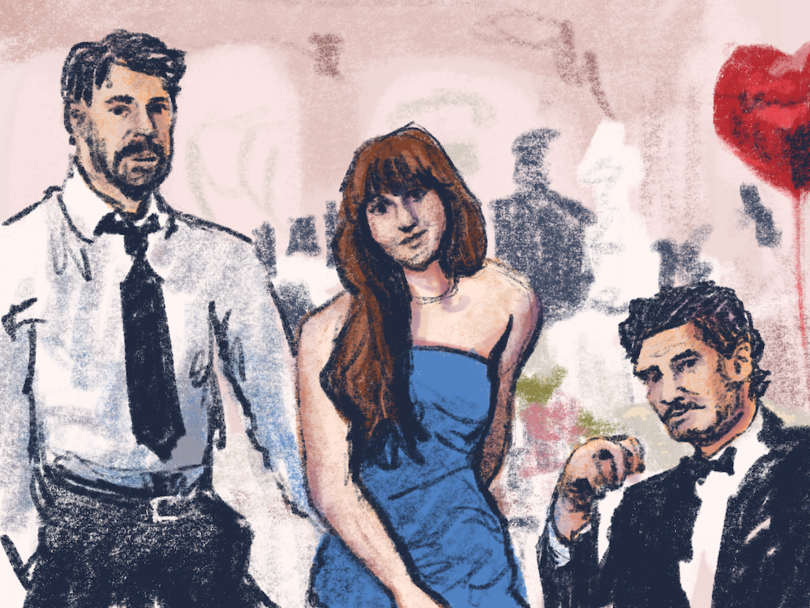‘Materialists’ debriefs love, self-value but lacks deep characters

Is marriage about true love, or is it just a business deal of compatible assets? With dry humor and tender love confessions, "Materialists" answers this question through the story of successful matchmaker Lucy. Emma Lee | Contributing Illustrator
Get the latest Syracuse news delivered right to your inbox.
Subscribe to our newsletter here.
Editor’s note: This article contains mention of sexual assault.
Tall or short? Rich or poor? High-end restaurant or halal food for a dinner date? These are a fraction of the qualities we consider when searching for our perfect match; our lifetime partners.
But is love simply a trade-off? Is marriage just a business deal?
Celine Song’s sophomore film “Materialists” answers these questions, inspecting how we value ourselves and each other in love and relationships. It breaks down and critiques our modern dating culture and the view of romance as a transactional relationship that only fulfills our yearning to be valued. It explores the struggle of finding true love in an increasingly materialistic world, as the title suggests.
The movie follows successful New York City matchmaker Lucy (Dakota Johnson) as she navigates her clients’ love lives, and her own. Lucy views love and dating as a numbers game; a mathematical calculation of compatible assets. Her clients come to her with an endless list of measurable material virtues: preferences in height, weight, income, political affiliation, you name it.
While she tells her clients she’s helping them marry the love of their life, the person they’ll change diapers with and their “grave buddy,” she doesn’t really believe it. To her, it’s all formulaic — and that’s what makes her so good at her job.
When Lucy attends a client’s wedding and meets the suave, rich Harry (Pedro Pascal) and runs into her handsome, broke ex-boyfriend John (Chris Evans), the story of two manifestations of love begins to unfold.
After meeting at the wedding, Lucy begins to explore her interest in Harry. He takes her on lavish, expensive dates. Their chemistry is undeniable and many of their views align. However, through their conversations, we see how Lucy judges her own self-worth the same way she does her clients.
Time and time again, she tries to convince Harry what she believes: that they just don’t match. He’s rich, she’s poor — they don’t check each other’s boxes. To this, Harry says he wants her not for her material assets, but for her intangible ones.
At the same time, Lucy reminisces on her failed relationship with John, which ended because of their combined financial stress. She finds comfort in his familiarity, confiding in him when she faces problems in her career.
Song took inspiration from films like Paul Thomas Anderson’s “Phantom Thread” in her use of dialogue and silence to convey a message. Using different camera angles, she often shifts the focus throughout scenes, painting a complex picture. Shot on 35mm, it’s a visual spectacle.
Lucy and Harry’s conversations are set in locations that, like their relationship, exude luxury and charm. They talk about careers, income and upbringing. On the contrary, the beats of silence and exchanges of telling looks between Lucy and John reveal a shared history and deeper emotional connection.
At a turning point in the film, Lucy finds out that one of her loyal clients, Sophie (Zoë Winters), was sexually assaulted by a match she set her up with. It’s a wake-up call for Lucy. Sophie calls her out, telling her that people aren’t “worthless merchandise.”
This part of the plot effectively conveys that dating is a risk — even if you do everything right, you can still endure so much hurt and trauma. As a character, Sophie brings the most depth to the plot. Winters’ performance is touching and I found her story to be the most compelling. Without her character’s arc, the film would have no climactic incident.
But sexual assault is an issue that deserves a larger, more fleshed-out storyline for viewers to fully understand its implications. But it seems to have been written solely to further develop Lucy’s character and story, which feels wrong in the context of the film. A few moments of focus to simply move the film along isn’t enough.
Since its release, fans and critics have debated the effectiveness of the film’s message of love, but I think as a comedy, it pulls its weight. Johnson’s classic dry humor works well in sequences of Lucy with her needy clients, poking fun at the shallowness of people’s dating requirements. Older men in their late 40s want “older women” to settle down with, but god forbid they be in their 30s. A high-strung client presents Lucy with a pamphlet of requirements, which she believes she deserves because she’s a “catch.”
Song also cites inspiration from Jane Austen’s satirical displays of courtship and romance in her novels. In “Materialists,” Song observes how society has commodified relationships through matchmaking, the same way Austen critiqued marriage and the social classes of her time in her novels.
While Song’s message is clear, the characters she wrote to deliver it fall flat. It pales in comparison to Song’s debut film “Past Lives,” where audiences were instantly captivated by the three protagonists from the opening scene.
The characters in “Materialists” deliver punching dialogue but offer little depth, leaving viewers uninvested in their relationships. Character dynamics felt undercooked, and the contexts of their circumstances didn’t feel fleshed out enough. The script spends more time telling us that Lucy and John love each other than it does proving it.
“Materialists” is a romantic comedy about choosing the life you believe you deserve. It’s not just about romance, but also the struggle of self-love. Every character proves to have insecurities in the things they offer romantically.
Lucy holds a strong stance on her value through years of critiquing others’ love lives. Harry knows his worth lies primarily in his financial assets, and John can’t get past his lack of them. For Lucy and Harry, it was never going to work because they couldn’t stop categorizing themselves into boxes to check. A majority of their conversations centered around how compatible (or not) they were on paper.
Right before the two break up, Lucy learns that Harry has gone through limb lengthening surgery to add six inches to his height. While this revelation seems ridiculous, it highlights Harry’s low self-esteem. He thought being with Lucy would fulfill him because they both viewed themselves as less worthy of love due to their insecurities.
Lucy picks John because unlike her and Harry, they share an easy love for one another, one that isn’t weighed in material goods or net income. When John confesses his love for Lucy — mirroring her matchmaking sales pitch — he says, “When I see your face, I see wrinkles and children that look like you.”
This film teaches us that love walks into our lives unexpectedly. It comes in the moments our guards are down, when we’re not busy weighing our value and that of prospective partners.
An interesting opening scene shows a caveman proposing to his lover using a daisy as a ring, set up as the first ever marriage. It sets the tone for the rest of the movie, challenging audiences to ponder what love meant before all the societal expectations and financial burdens.
At the end of the day, “Materialists” is for the hopeless romantics. Many will claim it to be unrealistic — in this economy, who would turn down a rich and tasteful Pedro Pascal? But it forces audiences to ask themselves what it is they value in romance. Is it all wealth and security or is it that unexplainable pull to somebody?





